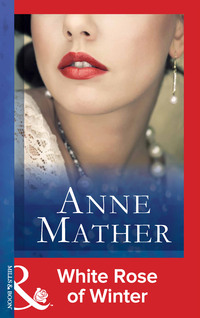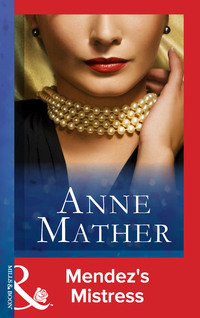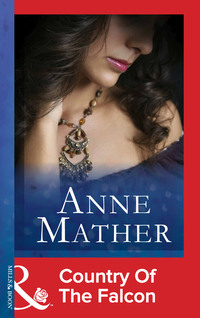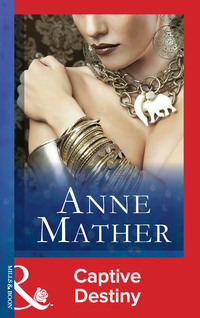
Полная версия
Rachel Trevellyan


Mills & Boon is proud to present a fabulous
collection of fantastic novels by
bestselling, much loved author
ANNE MATHER
Anne has a stellar record of achievement within the
publishing industry, having written over one hundred
and sixty books, with worldwide sales of more than
forty-eight MILLION copies in multiple languages.
This amazing collection of classic stories offers a chance
for readers to recapture the pleasure Anne’s powerful,
passionate writing has given.
We are sure you will love them all!
I’ve always wanted to write—which is not to say I’ve always wanted to be a professional writer. On the contrary, for years I only wrote for my own pleasure and it wasn’t until my husband suggested sending one of my stories to a publisher that we put several publishers’ names into a hat and pulled one out. The rest, as they say, is history. And now, one hundred and sixty-two books later, I’m literally—excuse the pun— staggered by what’s happened.
I had written all through my infant and junior years and on into my teens, the stories changing from children’s adventures to torrid gypsy passions. My mother used to gather these manuscripts up from time to time, when my bedroom became too untidy, and dispose of them! In those days, I used not to finish any of the stories and Caroline, my first published novel, was the first I’d ever completed. I was newly married then and my daughter was just a baby, and it was quite a job juggling my household chores and scribbling away in exercise books every chance I got. Not very professional, as you can imagine, but that’s the way it was.
These days, I have a bit more time to devote to my work, but that first love of writing has never changed. I can’t imagine not having a current book on the typewriter—yes, it’s my husband who transcribes everything on to the computer. He’s my partner in both life and work and I depend on his good sense more than I care to admit.
We have two grown-up children, a son and a daughter, and two almost grown-up grandchildren, Abi and Ben. My e-mail address is mystic-am@msn.com and I’d be happy to hear from any of my wonderful readers.
Rachel Trevellyan
Anne Mather

www.millsandboon.co.uk
MILLS & BOON
Before you start reading, why not sign up?
Thank you for downloading this Mills & Boon book. If you want to hear about exclusive discounts, special offers and competitions, sign up to our email newsletter today!
SIGN ME UP!
Or simply visit
signup.millsandboon.co.uk
Mills & Boon emails are completely free to receive and you can unsubscribe at any time via the link in any email we send you.
Table of Contents
Cover
About the Author
Title Page
CHAPTER ONE
CHAPTER TWO
CHAPTER THREE
CHAPTER FOUR
CHAPTER FIVE
CHAPTER SIX
CHAPTER SEVEN
CHAPTER EIGHT
CHAPTER NINE
CHAPTER TEN
CHAPTER ELEVEN
Copyright
CHAPTER ONE
HE was tired, very tired. The road through Cornwall had not been at all what he had expected after the long, fast-moving roads of his own country, and it had slowed his progress considerably. It was now after eight o’clock, darkness had fallen, and to add to his difficulties a sea fret was making the road ahead very hard to distinguish even with powerful headlights.
From Launceston the road had twisted and turned narrowly, an annoyance to the most patient of drivers, which he would be the first to admit he was not, and since leaving Penzance it had deteriorated into little more than a country lane. A series of sharp bends and precipitous summits had kept him continually in a low gear, and demanded all his concentration.
Occasionally, it had occurred to him that he was a fool, that he should not have agreed to undertake this journey at this time of the year. Although it was spring back home, it was still winter here even in this southern corner of England. But his mother had been so persuasive that he had not had the heart to refuse her. Apparently, Malcolm Trevellyan’s family had been kind to her in the past, and now that Malcolm was ill it was only natural that she should want to try and repay that kindness in some way. It was a long time since he had seen his mother so agitated about anything, and he had submitted to her demands for urgency.
He realised, too, that in spite of his mother’s almost total adaptation to the Portuguese way of life, since his father’s death two years ago she sometimes felt lonely and perhaps longed for someone from her native country to talk to.
He consulted the broad gold watch on its plain leather strap which encircled his wrist under the cuff of his plain grey suede jacket. Surely it could not be much further to Mawvry. His mother had said it was about ten miles from Penzance, which in the measurements he was used to meant something over sixteen kilometres. But on these roads and in these conditions it had seemed much further.
He began considering the arrangements he had made to transfer Malcolm Trevellyan to Mendao. Trevellyan was not a young man, and disabled into the bargain. He had had a severe attack of thrombosis two months ago which had left him partially paralysed and therefore unable to walk. But he was capable of riding in the back of a car, and that was why he had had this luxurious limousine made available to him at London Airport. Tomorrow they would make the return journey to London, board the plane for Lisbon, and be in Mendao by late afternoon. It was as simple as that. He did not want to stay longer. He had his own reasons for wishing to return to his estate as soon as possible. And once at the Quinta Martinez, Malcolm Trevellyan would want for nothing—his mother would see to that.
A signpost loomed out of the mist and the word Mawvry could clearly be seen. He sighed with relief. He was here at last. Now all he had to do was find the house of Malcolm Trevellyan.
The village was small, and when he parked the car in the square and slid stiffly from behind the driving wheel, the tang of salt filled his nostrils. Obviously he must be very near the sea, but at the moment the mist shrouded everything but his immediate surroundings.
Across the square a swinging sign indicated a tavern which appeared to be doing good business judging from the noise from within, and deciding it would be simpler to enquire the whereabouts of Malcolm Trevellyan’s house rather than attempting to find it he pulled a fur-lined jacket from the back of his car. Sliding his arms into the sleeves, he crossed the square, his collar turned up against the weather. He shivered. Even in the coldest months Mendao was not like this, and he thought with longing of the baroque beauty of the quinta, the lush valley in which it was situated, and the vivid blueness of the ocean that lapped not too many miles away. It would have been so much easier, he thought, not to have come himself; to have sent Alonzo Diaz or Juan d’Almera. But his mother had been curiously determined that he should be the one, and he imagined she wanted Malcolm Trevellyan to know that her invitation was a personal one.
The noise in the thick, smoky atmosphere of the bar decreased almost immediately when he pushed open the door. He felt the wave of curiosity that swept over the room, a sense of almost alien hostility.
He made his way to the bar and stood there, tall and dark, taller and darker than most of these dark Cornishmen. Speaking in slightly accented English, he said: ‘Pardon me, but could you direct me to the house of a Senhor Malcolm Trevellyan?’
The bartender stopped polishing the glass in his hand and he could have sworn the hostility around him strengthened.
‘And who might be asking?’ queried the bartender.
He sighed. ‘My name is unimportant. It would mean nothing to you. But I do wish to see Senhor Trevellyan, and as it is such an unpleasant evening, I thought perhaps——’
‘Folks round here don’t care to pass information to—foreigners,’ remarked a leathery-faced man on his right.
He controlled his annoyance with difficulty. ‘I assure you, my business with Senhor Trevellyan is perfectly respectable. He is expecting me. But the mist obliterates almost everything——’
The bartender glanced round at the avid faces about them and seemed to come to a decision. ‘You come in on the Penzance road?’
‘I suppose I did.’
‘Then you passed the Trevellyan place. ’Bout a mile back. Set off the road, it is, overlooking the sea.’
‘I’m very grateful. Thank you.’
He bowed his head politely and turned to go, but his way was barred by a husky young fisherman.
‘What business you got with old Trevellyan?’ he demanded belligerently. ‘Are you sure it’s not Rachel you come to see?’
‘Rachel?’ He frowned. ‘I’m afraid I know no one of that name.’
‘And you say you know Malcolm Trevellyan?’ The young man’s lip curled. ‘How can you know him and not Rachel?’
He thrust his hands deep into the pockets of his coat. ‘Who is Rachel, might I ask?’ He felt a stirring of unease.
The young man glanced round at his comrades. ‘Shall I tell him?’
An older man tugged at his sleeve. ‘Let him go, Bart. Maybe this is some business deal. Maybe he doesn’t know Rachel.’
His jaw felt taut. ‘Please,’ he said. ‘Enlighten me. Who is Rachel?’
‘Rachel’s his wife, of course,’ snapped the young fisherman grimly. ‘Didn’t you know?’
‘I’m afraid I did not.’
‘Bart!’ The older man dragged the younger one aside. ‘Leave it, boy. It’s no business of ours.’
‘Isn’t it? Isn’t it? Don’t you care what happens to Rachel?’
‘Of course I care——’ The older man was answering, but he waited to hear no more. Pressing his way through the throng of hostile faces, he reached the door and thrusting it open stepped out into the freezing air. In this instance the cold was a relief, infinitely preferable to the heat of the bar.
But as he walked back to the car his brain buzzed with the information he had just been presented. Malcolm Trevellyan was married! He had never mentioned it. In all Trevellyan’s correspondence with his mother, there had been no reference made to a wife. On the contrary, he recalled his mother’s comments that Malcolm had become a confirmed bachelor, and certainly four years ago when she and his father had visited England he had had no wife then.
The sense of unease increased. What did it mean? Had Trevellyan married some widow for companionship in his latter years? And if so, why hadn’t he told them? Or did he expect they knew? Did he presume the invitation he had received included his wife, too?
He shook his head and opening the car door slid back behind the wheel. How would his mother react if that were so? Would she want another woman at the quinta? The invitation extended to Trevellyan had been an open one, but if he had a wife ...
And what was the young fisherman’s interest in all this? Why were they so hostile to the name Trevellyan? Was it possible that the man Bart might be this unknown Rachel’s son?
He felt angry suddenly. He was cold and tired, a stranger in a strange country, and right now he wished he had booked in at a hotel in Penzance and left the return journey until two days hence.
Leaving the village square, he turned back on to the Penzance road. The mist had cleared slightly and he drove slowly, looking for the signs of a gatepost, some indication that a house lay back from the road.
He found it almost easily. There were no other houses in the area, and he turned between stone gateposts and ran up a narrow drive to where lights glinted from behind curtained windows. He stopped the car and slid out, looking up at the stone façade of the building. It was not a large house, but in the gloom there was something faintly menacing about it. Shrugging off such fanciful feelings, he walked up the steps to the door and knocked.
There was silence for so long that he knocked again, but then there was the sound of bolts being drawn and he waited irritably for the door to be opened. Deus, he thought with impatience. Surely he had been expected even at this hour? In his mother’s letter she had clearly stated the date and expected time of his arrival. Just because he was a little later than expected it should not mean that they had given him up, that they had bolted the door against him. They?
The door swung inward suddenly and in the light that was shed from the hall behind her he saw a girl. His first impression was of a glory of red-gold hair that tumbled in abundant confusion about an oval face. She was of medium height, but very slender which made her seem smaller. She was dressed in an old pair of denim trousers that clung to her like a second skin, and which, needless to say, would have horrified his mother and her friends, while the paint-daubed smock she wore with them revealed the slight swell of her breasts and the thinness of her arms. Who was this? He thought she looked about eighteen, but he could not be absolutely certain in this light. Long silky lashes brushed her cheeks and swept upward in surprise when she encountered his dark gaze. Had Malcolm Trevellyan a daughter as well as a wife?
‘Yes?’ She was abrupt.
He gave a slight bow and then wished he had not. But the Portuguese blood in his veins ran so much stronger than his English ancestry, and it was second nature to him to behave courteously.
‘I wish to see Senhor Malcolm Trevellyan, senhorita,’ he stated politely. ‘I am Luis Martinez, Marquês de Mendao!’
The girl stared at him uncomprehendingly for a moment. It was obvious she hadn’t the faintest idea who he was or that he was expected, and he felt reassured. Clearly she could not be a member of this household or she would have known. He had been beginning to think that Malcolm Trevellyan had concealed a great deal from his mother.
‘Won’t you come in?’
The girl stood aside with obvious reluctance and Luis entered the narrow hall. There was a carpet on the floor, but it was threadbare in places, and while everything was clean there was little in the way of comfort. Certainly Malcolm Trevellyan deserved more salubrious surroundings than these to recuperate in.
The door was closed behind them and the girl indicated that he should enter a room on his right.
‘If you’ll wait a moment, I’ll tell Malcolm you’re here,’ she said, rather stiffly.
Luis inclined his head. ‘Thank you.’ He allowed himself to be shown into a room which appeared to be a parlour. The door closed behind him and he looked about with interest.
In the poor light shed from a standard lamp which the girl had switched on at his entrance he saw that this room was rarely used. It had an unlived-in air, a mustiness about it, and the stiff-backed chairs and horsehair sofa were reminiscent of the kind of places described in English literature of the nineteenth century. He had read a great deal of English literature when he was at the university.
Bric-à-brac lined the mantelshelf, and as a collector of antiques he ran a practised eye over them. But there was nothing there to interest the expert and he folded his hands behind his back and paced rather restlessly about the room.
A clock chimed somewhere in the house and he glanced again at his watch. It was half past nine. He had been travelling since very early that morning. No wonder he was beginning to feel weary and lacking in patience.
The door behind him opened suddenly and he swung round to confront the girl who stood in the aperture. There was a certain wary speculation in her eyes now and he wondered why. He wondered, too, what she was doing here at this time of night, and recalled belatedly that the doors had been bolted on his arrival. Why should she be staying here when she apparently knew so little of her host’s affairs?
Seen in this light she was perhaps a little older than he had at first imagined. Twenty-one, maybe, or twenty-two; surely no more. In her casual clothes she was, he thought, a typical example of emancipated youth, and he pondered what his mother’s reactions to her might be. Portuguese girls were not allowed to wear such attire; they were not allowed such freedom. They dressed conservatively. They retained, or so Luis had been brought up to believe, a certain detachment, an aura of mystery, that was only lifted to admit their betrothed, their chosen husband. He supposed there was a kind of Moorish influence still evident in his country that favoured the customs of the seraglio, the segregation of women both before and after marriage.
‘If you’ll come this way,’ the girl said now, and Luis unbuttoned his overcoat and nodded.
The girl led the way along the hall to a room at the back of the house which Luis suspected in daylight probably gave a view of the coastline. But tonight the curtains were drawn across the windows and the only light came from a lamp beside the huge double bed which dominated the room. There was an enormous fire burning in the wide grate which gave out an uncomfortable amount of heat, and propped on pillows in the middle of the tumbled bed was a figure in thick pyjamas who stared at him with piercing blue eyes.
Malcolm Trevellyan must have been about fifty, but he looked older. Thinning hair topped a face that was prematurely lined, and although he must once have been quite a big man now the fleshless skin hung on him.
Luis glanced round at the girl, who had remained by the door when he entered the room, and seeing that she was making no move to leave, he said: ‘How do you do, Senhor Trevellyan. I am Luis Martinez, at your service. You were expecting me?’
‘Of course. Of course. Come in.’ Malcolm Trevellyan spoke welcomingly, his voice strong and imperative. ‘Have you had a good journey? You’re later than I expected, but I suppose the weather hasn’t helped. Cold, isn’t it? Not what you’re used to, I suppose.’
‘No.’ Luis managed a faint smile. ‘How are you, senhor?’
‘Oh, I’ll be all right. Got to take it easy, that’s all.’ He indicated his legs outlined beneath the bedcovers. ‘Can’t do much else at the moment.’
‘I’m sorry.’ Luis glanced back at the girl again. ‘However, I am sure you will find Mendao a much less demanding climate.’
He heard the girl behind him catch her breath on a gasp, and suddenly the man seemed to remember she was there. Waving his arms about with obvious annoyance, he snapped: ‘Don’t just stand there, Rachel! Go and make our guest some tea and sandwiches. I’m sure he could do with something after his journey!’
Luis felt a creeping sense of disbelief invading his senses. Trevellyan had called the girl Rachel. Rachel! And down at the tavern in the village, the young fisherman had angrily thrown the name of Trevellyan’s wife at him and that had been Rachel, too. Deus, this girl could not be Trevellyan’s wife, could she? He felt almost sickened at the thought.
He looked round, but she had gone, and suddenly he wished he had let Juan or Alonzo come here in his place. He wanted no part of this.
But he was here, he was committed, and he had to ask the inevitable question:
‘That young woman, senhor? She is some relation of yours?’
Malcolm Trevellyan sniffed and gathered the rugs closer about him. ‘I suppose you would say that. I have to talk to you about her, senhor.’
Luis folded his hands behind his back again. It was a favourite position of his and right now he had no desire to sit in this man’s presence.
Malcolm Trevellyan seemed to realise that Luis was waiting for an explanation, and with a sigh, he began: ‘Rachel is my wife, senhor.’
Luis felt the muscles of his face hardening. ‘Indeed?’
‘Yes, but please, let me explain.’
‘You did not explain the situation to my mother, senhor.’
‘I know, I know. And I’m sorry. But there was no way I could, you see. It’s something I needed to talk to you about, to discuss with you, to explain the circumstances——’
‘What circumstances, senhor?’
Trevellyan tugged at the lobe of his ear. ‘Rachel and I have been married three years, senhor. She was only eighteen at that time, and her father had just died.’ He shook his head. ‘I am not one to judge people, but Rachel was a trial to her father. Poor man, he did not know how to deal with her. She’s an artist, senhor, and perhaps even in your country you know what artists are. They like to call themselves free-living individuals. For free-living, substitute free-loving, and there you have their way of life in a nutshell.’
Luis’s ring with its large inset emerald dug into his fingers. ‘What are you trying to say, senhor?’
Trevellyan sighed. ‘It’s not easy, senhor. Rachel is my wife, and I love her. But I don’t always understand her.’
‘Go on!’ Luis was impatient.
‘Very well. At the time her father died, Rachel was pregnant. The man, whoever he was, had deserted her, and she was alone. Her father and I had always been friends and I couldn’t see her destitute. I offered marriage on the understanding that she could continue with her painting, and she accepted. Unfortunately she miscarried, and the child was never born.’
‘I see.’ Luis felt a sense of distaste. ‘And you could not tell my mother of this?’
‘How could I? Is it something you could baldly write in a letter?’
‘Perhaps not.’ Luis shrugged his broad shoulders. ‘So what do you expect her to do now?’
Trevellyan lay back weakly on his pillows. ‘Rachel knows me, senhor. She knows my likes and dislikes, and she has cared for me, after her fashion. I wouldn’t like to leave her here alone, at the mercy of her own weaknesses.’
‘You are suggesting that—that your wife accompanies us to Mendao?’
The other man’s eyes sought his appealingly. ‘Would it be such a trial to you—to your mother? I promise you, she would cause no trouble.’
Luis could have almost laughed at the farcical aspects of this situation had it not been so serious. How could Trevellyan expect to control his wife from his bed—or even a wheelchair for that matter? Unless years of marriage with him had tempered her rebellious nature, destroyed the streak of wildness which had previously caused such unhappiness. He took a deep breath. Even after everything he had heard, the idea of that girl being married to Malcolm Trevellyan could make him feel physically sick. And he couldn’t imagine why. It was nothing to do with him.
Now Luis ran a hand round the back of his neck, over the smooth black hair that brushed his collar. ‘But it seemed obvious when I arrived that—that Senhora Trevellyan knew nothing of my reasons for being here.’
Trevellyan plucked at the bedcovers. ‘I know, I know. I haven’t mentioned my plans to her yet.’
‘Why not?’
‘How could I? I didn’t even know whether you—or your mother—would permit her to accompany me.’
‘I see.’ Luis’s hand fell to his side.
There were footsteps outside in the hall and presently the girl entered the room again carrying a tray. Luis’s immediate instinct was to take the tray from her, but then he stood politely aside and allowed her to place it on the table beside the bed.









